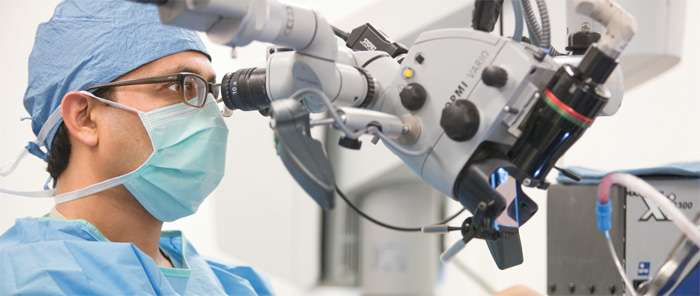Swallow Preservation Program
Find your care
Our Head and Neck Cancer Program helps you start on the road to recovery. For more information, connect with a cancer care specialist at 310-267-7076.
The UCLA Swallow Preservation Program helps patients who are receiving radiation therapy to maintain as much swallow function as possible.

Patients who have had radiation therapy for head and neck cancer may risk developing radiation fibrosis. This condition can impair their ability to swallow over time:
- Radiation fibrosis can lead to scarring, which restricts muscle movement and leads to muscle weakness.
- Nerves in the radiated area can be damaged, which may also lead to muscle weakness and reduced sensation.
Benefits of UCLA Swallow Preservation Program
During and after their radiation therapy, patients in the Swallow Preservation Program receive therapy from a speech pathologist every week.
Some program benefits include:
- Swallow therapy can help reduce your discomfort so that you can continue to swallow normally. That means that you can maintain a normal diet without a feeding tube.
- Maintaining your range of motion of swallow structures may reduce the development of scar tissue associated with radiation fibrosis.
- Continued use of swallow structures during radiation (for swallowing and exercise) will stimulate the nerves involved in swallowing. This nervous system stimulation may help preserve swallow function.
Swallow Preservation Program: What to Expect
Your physician may recommend you to the Swallow Preservation Program if you have had treatment for head and neck cancer. The program services include the following:
- Referral to the Speech Pathology Clinic, usually before your radiation starts
- Modified barium swallow study to document your pretreatment swallow status and help your radiation oncologist plan your treatment
- Weekly visits to the Speech Pathology Clinic to learn swallow exercises before or near the beginning of your radiation therapy
Around 2 months after your radiation therapy is complete, you will participate in another modified barium swallow study. This study is performed to:
- Identify any swallow problems that require treatment
- Determine whether you need information on your swallowing function and what consistencies of food and liquid will be best to swallow
- Decide whether you need to be referred to the Swallowing Disorders Program for any residual swallowing issues for evaluation and management
Swallow Preservation Research by UCLA Head and Neck Cancer Program
Our physicians recently published an article titled “Swallow Preservation Exercises During Chemoradiation Therapy Maintains Swallow Function.” Their research shoed that compliance with swallow preservation protocol leads to:
- Patients’ ability to maintain their diet
- Reduced need for gastric feeding tubes
- Reduced risk of developing esophageal stenosis (narrowing of the esophagus, the tube from the mouth to the stomach
Swallow Preservation Appointments
- Contact Us >
- Phone: (310) 267-7076
Learn more:
What is UCLA’s experience with swallow preservation? A recent publication titled “Swallow Preservation Exercises during Chemoradiation Therapy Maintains Swallow Function” from HNCP physicians showed that compliance with swallow preservation protocol leads to maintenance of diet, and reduces incidence of gastric tubes and esophageal stenosis.
View Abstract on PubMed >